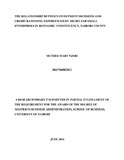| dc.description.abstract | The MSE sector is very important in developing countries because it helps in wealth creation
and.reduction of unemployment. However, the MSEs face many challenges in obtaining credit to
ensure continuity of the businesses into the future as their growth depends on amounts of funds
availed to the enterprises to enable them make sound investment decisions. Many studies have
shown that majority of the MSEs lack proper business records and some of the MSEs do not
maintain bank accounts which leads to the MSEs not being considered credit worthy by finance
providers.Thus,there is need to address the way MSEs make their investment decisions when
they experience credit rationing from the finance providers. The objective of the study was to
establish the relationship between investment decisions and credit rationing experienced by
micro and small enterprises in Roysambu Constituency, Nairobi County. The population of the
study was the MSEs located in Roysambu Constituency and the sampling frame included all the
MSEs in the constituency licensed by the County Council. Stratified and random samplings were
used while questionnaires were utilized for data collection. Descriptive research design was used
and data analysis was done through regression while further analysis was done using descriptive
analysis. The study found that the relationship existing between investment decisions and credit
rationing experienced by MSEs is positive as there is a positive correlation between credit
rationing experienced by the MSEs and investment decisions made by the MSEs.From the study
the following policy recommendations were suggested; There is a need to train owners of MSEs
on how to keep proper financial records and working capital management to ensure that they are
granted full loans by the finance providers. The finance providers need to introduce loans
targeting MSEs which should have flexible repayment schedules so that the MSEs are motivated
lending limits and securities required when obtaining loans from the finance providers. | en_US |

